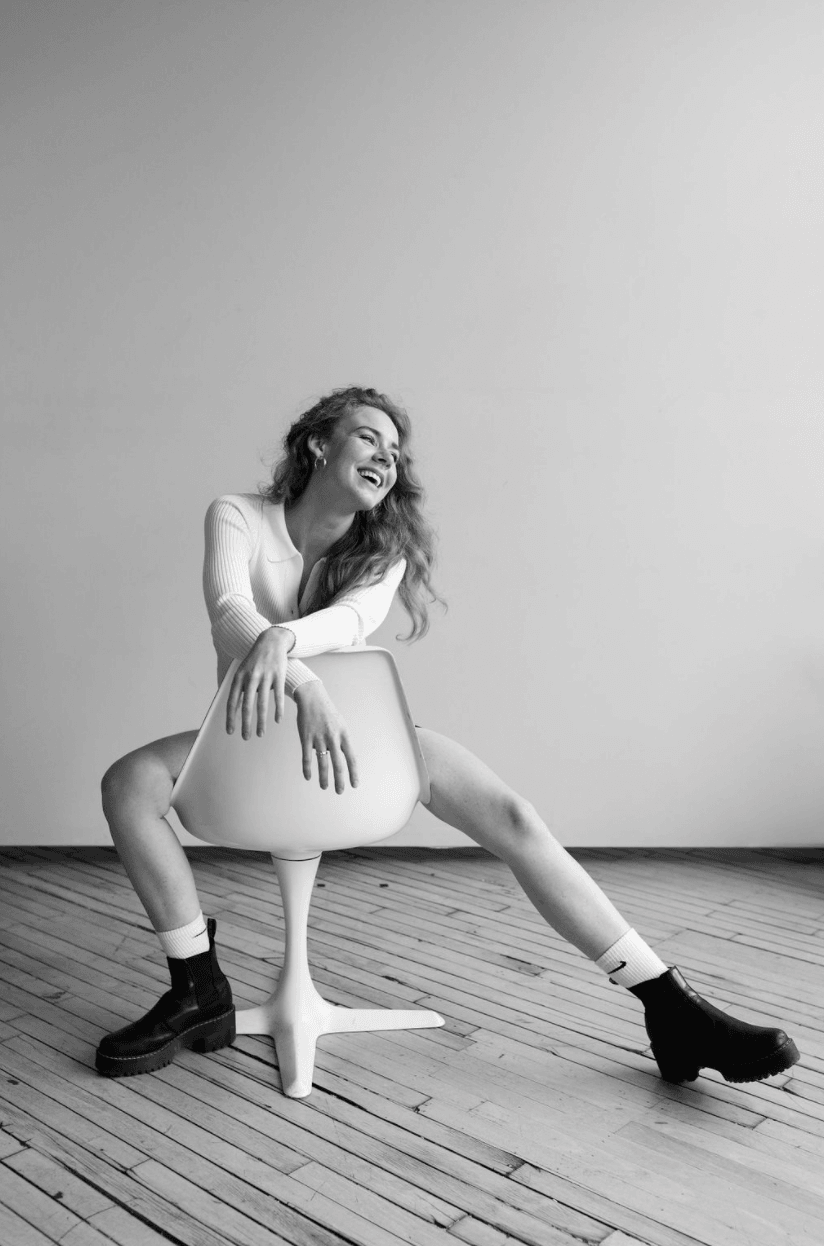We caught up with the brilliant and insightful Moriah Joy a few weeks ago and have shared our conversation below.
Hi Moriah, thanks for joining us today. Do you think your parents have had a meaningful impact on you and your journey?
My parents know how to show up well. I can close my eyes and still hear my dad’s whistle that would ring through the auditorium after I’d take a bow. They taught me the value of being present. And their presence became a gift they were so willing to give over and over again. Every middle school play, high school band concert, and living room performance, they were there. But not just there, they were invested. And they did the same for my brother, wearing all of our college’s merch like it was it’s own clothing line. They were excited to be our parents. Whenever my dad and I are alone together, he’ll ask me “What’s it like being Moriah these days?” To me, that says it all. Having such intentional caregivers taught me the beauty of listening – and the best part is, it doesn’t take much, just consistency and time. I am truly blessed to say that my childhood home was a safe space created by two people who loved fiercely and made sure you knew it. This environment only grew me into a more self-aware artist and future Speech-Language Pathologist. Now, it’s my turn. I want to create that type of safe space for future audiences and pediatric clients. Whether that’s through a power ballad performance or teaching a child how to say “I love you” to his mom, I will continue to show up well for others, just as Brit and Renee did for me.


Moriah, before we move on to more of these sorts of questions, can you take some time to bring our readers up to speed on you and what you do?
I am a Chicago-based actor, model, and playwright who happened to fall in love with the performing arts on an ordinary Saturday. My grandma decided to take me to the SteelBeam Theatre to see The Wizard of Oz and my gap-toothed, six-year-old smile guided us inside. I held my program tight and sat down in a modest theater house with my eyes fixed on the stage. The moment the lights dimmed and the actors walked on stage, I whispered not so quietly to my grandma, “Can I do that?”. As I took in the magic of playing pretend, theater took up real estate in my soul.
Since that formative experience, I’ve had the privilege of working on a variety of artistic projects: two favorites have been The Actor’s Workout led by Sarah Tolan-Mee and #HereToo directed by Laramie Project founder, Barbara Pitts McAdams. I’ve also secured roles in short films, commercial shoots, and won the Jim Jacobs Scholarship. In a different artistic vein, I studied under Professor Paul Amandes at Columbia College Chicago and, through his guidance, was able to get my original 10-minute play Color published in Anthology, RENAISSANCE. But the last thing I want to leave anyone who reads this with is a laundry list of my resumé experience. Because what isn’t mentioned are the abundant no’s, silences, and “we regret to inform you” emails. But what has kept my creativity alive in the midst of opportunity droughts is the other kindle in the fire: Speech-Language Pathology.
Growing up, I viewed my mom as a superhero I shared a home with. She was the first in her family to earn a doctorate degree, let alone start a business and make strides for female representation in the healthcare industry. She also was the first person to introduce me to Speech-Language Pathology (SLP). For anyone unfamiliar with this career path, I like to describe the SLP world as teaching people how to talk back. This can range from pediatric private practice to geriatric rehabilitation in a hospital setting. Currently, I work as a Speech-Language Pathology Assistant (C-SLPA) at a pediatric private practice. My case load primarily consists of patients with an Autism Spectrum Diagnosis (ASD) who often use alternative forms of communication, such as ASL or AAC devices. These kiddos have changed my life. Whether it’s watching a non-verbal client functionally communicate for the first time or seeing a child’s face light up when they correctly produce a phonetic sound, their wins have become my joy.
In the future, my goal is to open up a small theater company for children with speech impairments. The scripts used would be written to provide speech therapy for a variety of disorders, and music would be used as a tool to promote fluency development. Can you imagine a room full of children who typically don’t go near a stage using acting and song to improve their communication skills? Such an empowering opportunity would erase preconceived limitations of the neurodiverse community and instead replace restriction with inclusion.
My LinkedIn will tell you that I’m a Chicago-based actor, model, and future Speech-Language Pathologist. But beneath those ambitions is the red-headed little girl who found herself through theater, now eager to provide that same experience for others. Sustaining a busy, complicated career path isn’t easy, but having the chance to empower those around me makes the late nights and early mornings more than worth it.


Learning and unlearning are both critical parts of growth – can you share a story of a time when you had to unlearn a lesson?
Creatives know what it means to fail. And I love that. The industry motto is “rejection is redirection” for a reason. To be honest, I believed that was true for everyone else except myself until I actually started sending in the self-tapes and walking into the audition rooms. For the first few months of truly “doing it” I was allowing the no’s to sit with me instead of teach me. I would hold on to the rejected self-tapes as personality traits rather than recognize them as points of growth and move toward a different door. The most rewarding part of being a creative is the shared comradery of trying again. No one’s giving you a second look because it’s your sixth time in the Actor’s Equity building that week. No one’s questioning why you’re sending in another self-tape to that casting director you have yet to hear back from. Actually it’s quite the opposite. Giving yourself permission to fail is living in a freedom that I’ve found leads to tangible progress. It’s ironic, isn’t it? We’re taught failure is a sign of a stagnant career when in reality, that’s when we’re actually getting somewhere. Of course, I think this rewarding aspect of being an artist takes a lifetime to get behind, but it’s an invaluable perspective nonetheless.


Let’s talk about resilience next – do you have a story you can share with us?
In 2020, I set a goal of graduating from two universities in three years – one online and one in-person. Many ask why I chose to set such an unorthodox standard for my undergraduate experience. My answer was this: I want my career in Speech-Language Pathology to be fueled by creative passion and knowledge that can support the incorporation of art into therapy sessions.
However, as Covid-19 overtook the United States, my admissions counselors cautioned me to rethink my decision because “people don’t do college that way” – especially in the middle of a pandemic. But I decided to see the nationwide lockdown as an opportunity, rather than an obstacle to my educational pursuits. When I arrived on campus at Columbia College Chicago, I entered my dorm wearing a KN-95, looked around at the room that was supposed to have a roommate, and sat down at my desk to plan out what I had just signed up for: two class schedules, two completely different majors, all while juggling an unprecedented time and hoping to see the inside of a classroom sometime soon.
Over the next year, that dorm room would witness online dance classes, anatomy and physiology finals, and hours upon hours of studying. As I continued forward toward achieving both diplomas, I would often look back and remember who I became living in Suite 818A: a girl driven by creative ambition who dissected an eyeball next to her mini-fridge and performed cabaret tributes to Sondhiem over Zoom. As I closed the door to Suite 818A for the last time at the end of freshman year, I remember looking at myself in a window and seeing a smile. I was still two years away from earning my degree, but a more creative, competent woman was staring back at me in that moment.
Contact Info:
- Instagram: @moriah_joyy
- Linkedin: https://www.linkedin.com/in/moriah-gilman
- Other: Agency Resumé: https://resumes.breakdownexpress.com/2034686-5710988-20284


Image Credits
AppleJStudio, EmilyDavis Studio & Ty Grove


